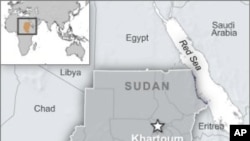Six months after the exuberance of independence, South Sudan is struggling with major challenges, including recurring internal violence, large scale corruption, daunting security sector reform and growing disputes with Sudan to the north.
Deadly clashes between rival communities in Jonglei state in recent weeks have displaced tens of thousands of civilians and killed a yet to be determined number of people. The clashes followed similar violence in the same state in August, just weeks after South Sudan came into existence.
Eric Reeves, a Sudan researcher at Smith College, says it has been an extremely difficult beginning, in terms of security. “The situation is rather grim and for a number of reasons, some of them have to do with the ethnic rivalries we have seen on display in gruesome fashion in Jonglei and elsewhere in South Sudan. The renegade rebel groups like the South Sudan Liberation Army supplied by Khartoum have also proven very destabilizing," he said.
For its part, Sudan’s government has accused South Sudan of funding and arming cross-border former Sudan People’s Liberation Army fighters.
Former leaders from the SPLA, which fought a two-decade civil war against Sudan, now head the South Sudanese government in Juba.
The two governments have been unable to make progress on several outstanding issues that peace deals and the official breakup failed to fully address. One is how to share oil revenue, which comes from South Sudan but transits through Sudan.
Analysts agree that issue will be very complicated to resolve. But they say there also are pressing issues over which officials from South Sudan could take more control.
Jonathan Temin, from the United States Institute of Peace, says he would like to see officials instill more national pride. “One of the greatest challenges South Sudan faces now is defining itself and creating a greater sense of what it means to be South Sudanese. As in many parts of Africa, people in South Sudan tend to identify first with their ethnic group and only second or third with their country, and particularly when the country is as new as South Sudan is, it is a particular challenge," he said.
J. Peter Pham, the Africa director for the Atlantic Council, says creating development, infrastructure, economic growth and opportunity is also extremely crucial.
He would like to see more emphasis on agriculture. “We are talking about a country that is 80 percent arable, well watered, yet less than 10 percent of that space that could be dedicated to agriculture is actually even farmed," he said.
A Sudan and South Sudan expert at Fordham University, Amir Idris, is fearful for South Sudanese if economic and social issues are not addressed quickly. “This cycle of violence will continue and South Sudan will suffer from that, and the SPLA itself might fragment along ethnic lines and that is going to create a serious problem for both the government of South Sudan and the international community," he said.
The international community, including the U.S. government, pushed hard diplomatically for ending the civil war and bringing about the creation of South Sudan.
Idris says he believes too much emphasis is now being put on the capital, Juba, and the country’s government structure, rather than effective nation building.
South Sudan analysts say they also worry about reports of large scale corruption among government leaders and how outside aid may not be benefiting most South Sudanese. They say they fear this also could lead to more infighting.




